© NCC Education Limited. V 1. 0 Essentials

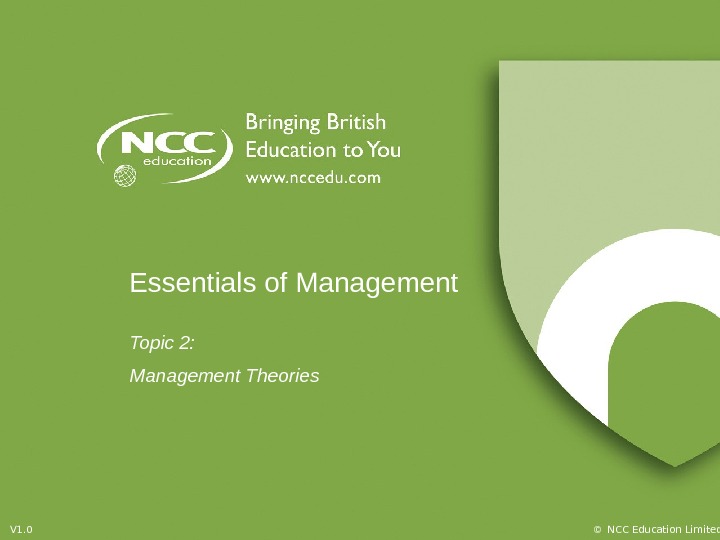
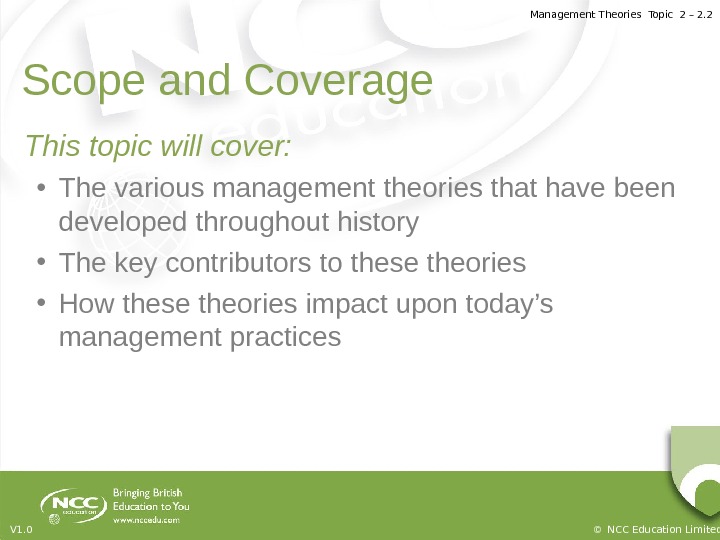
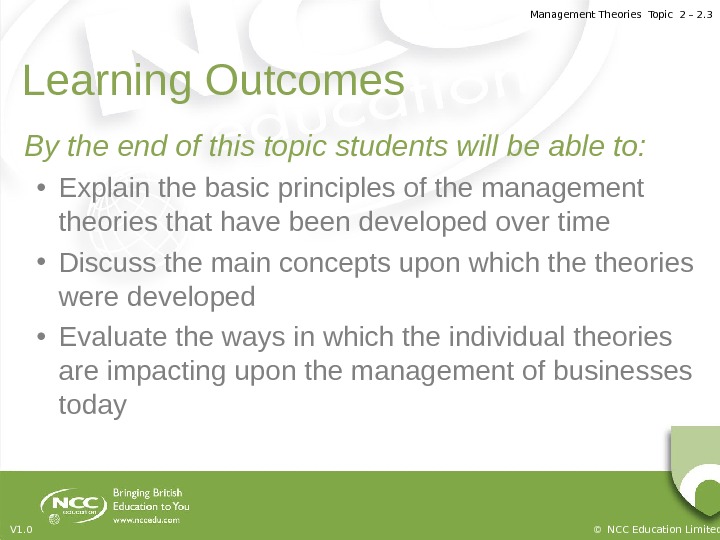
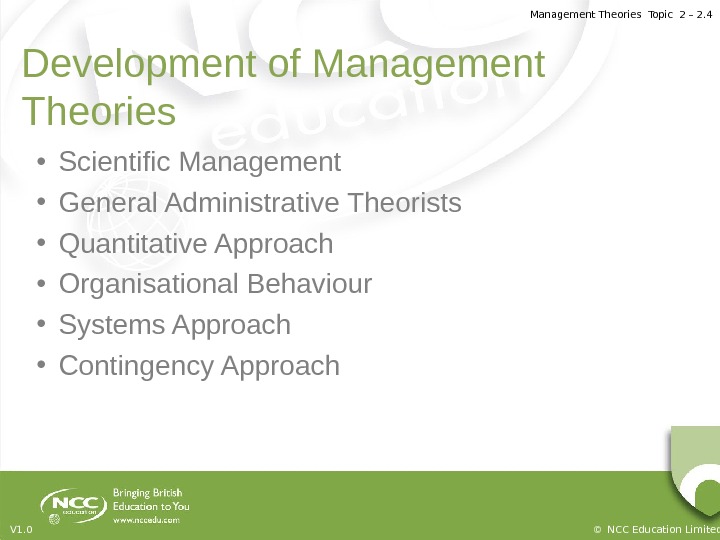

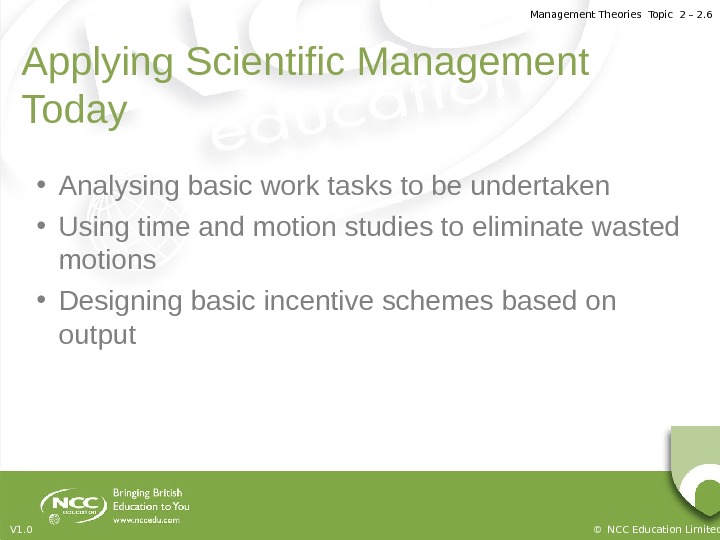

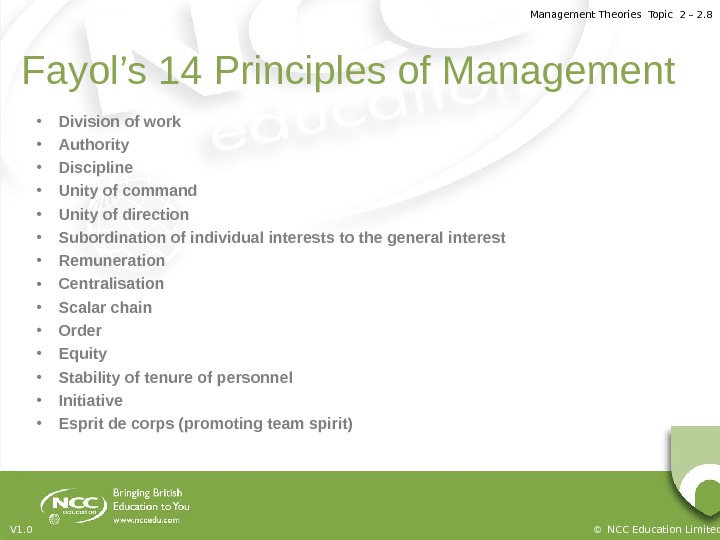
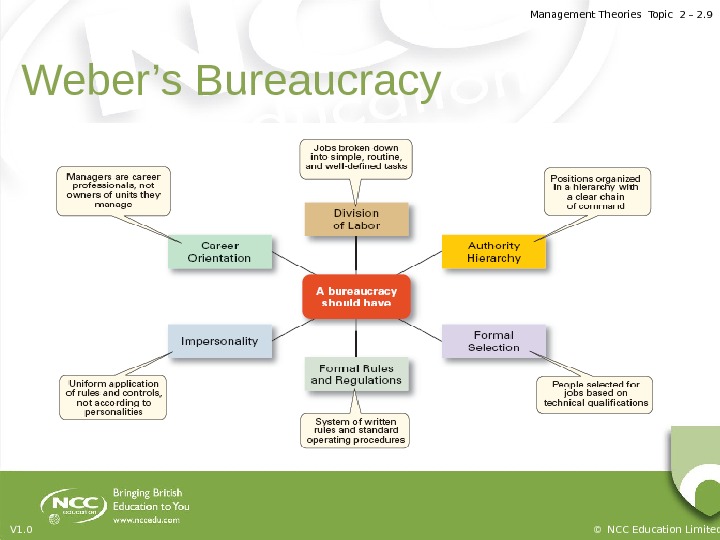
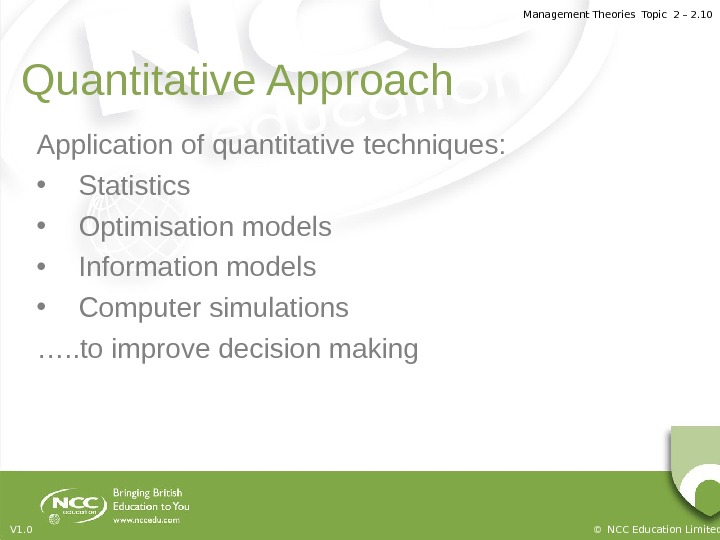
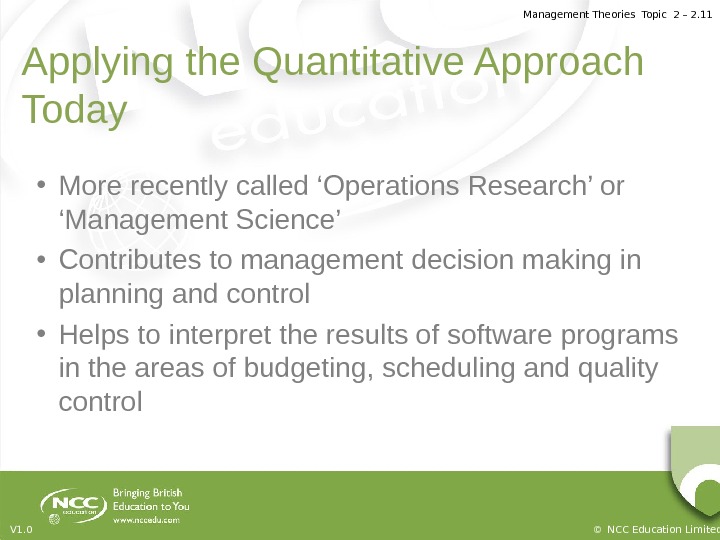

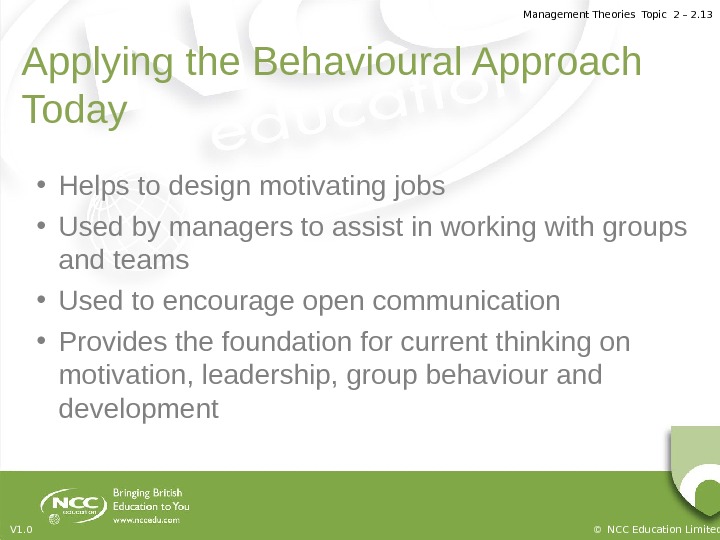
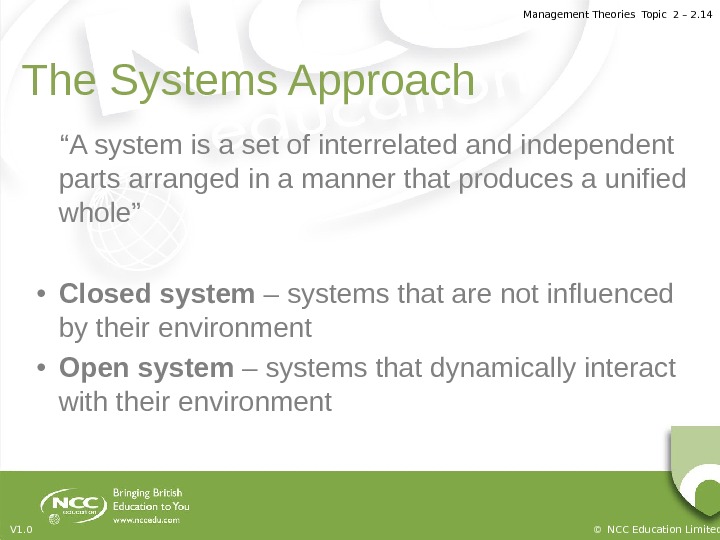
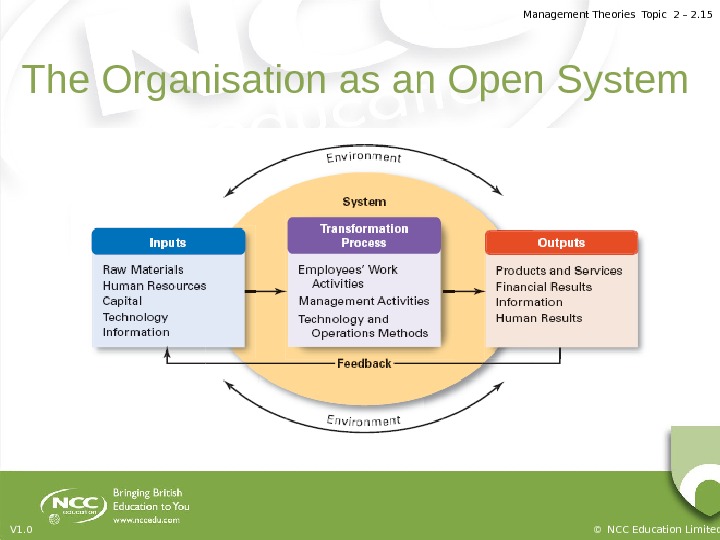
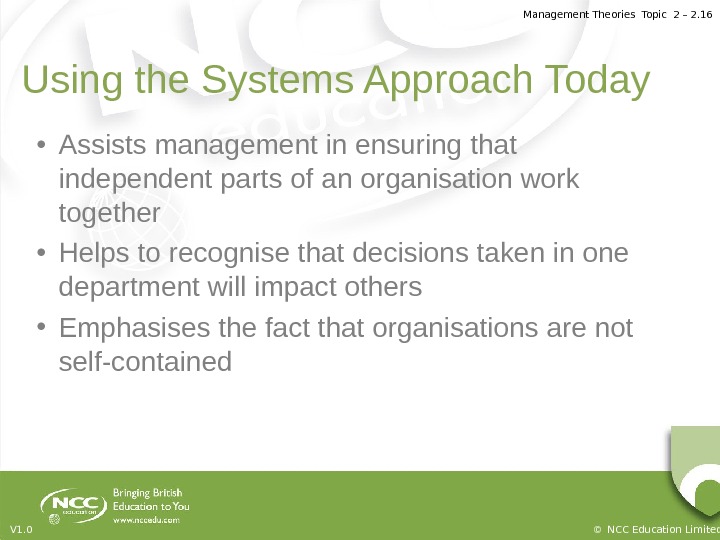
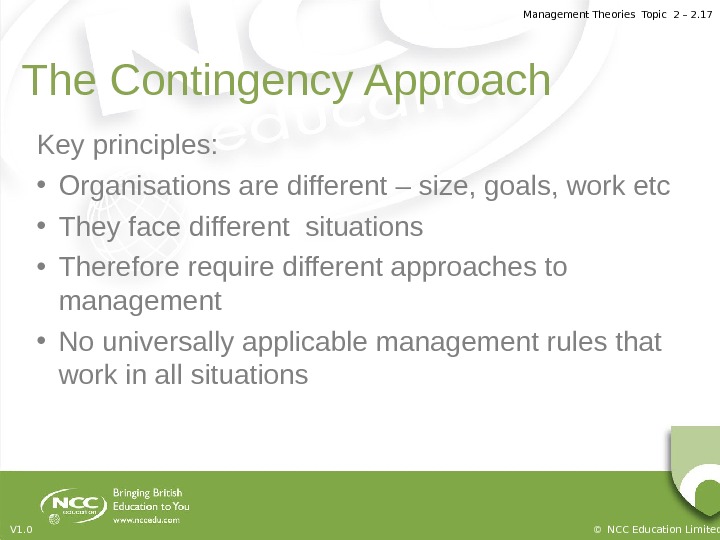
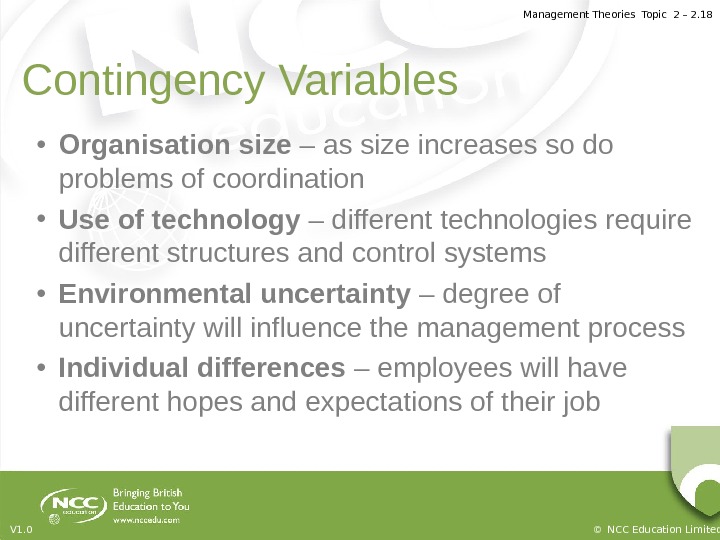
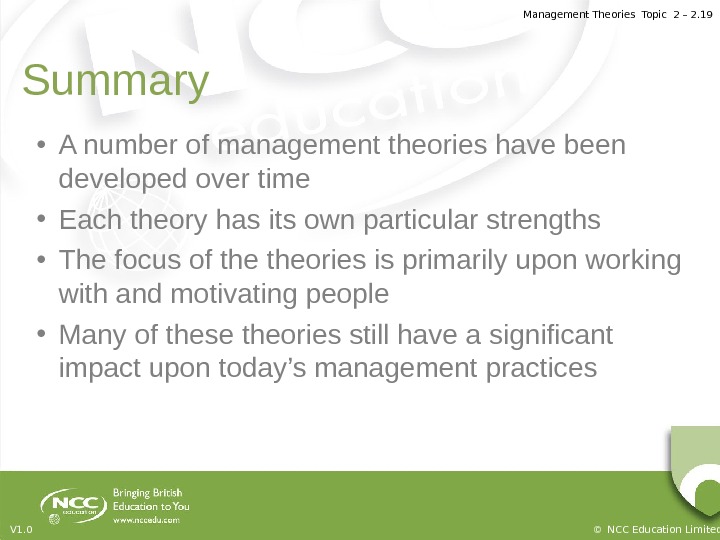
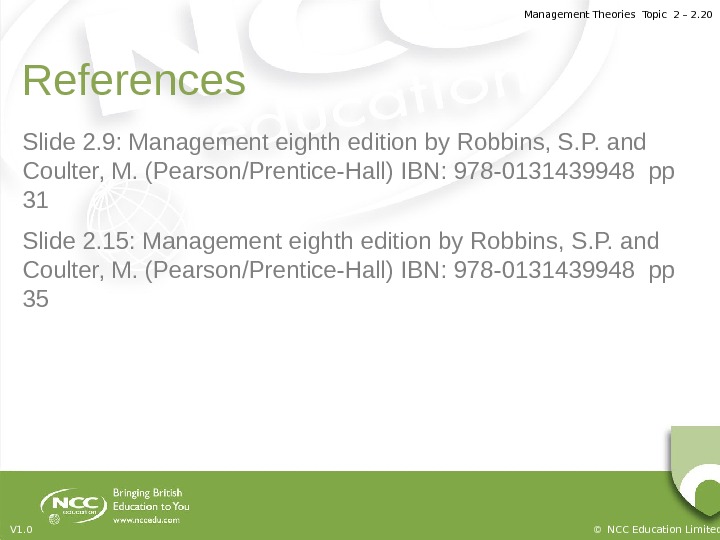
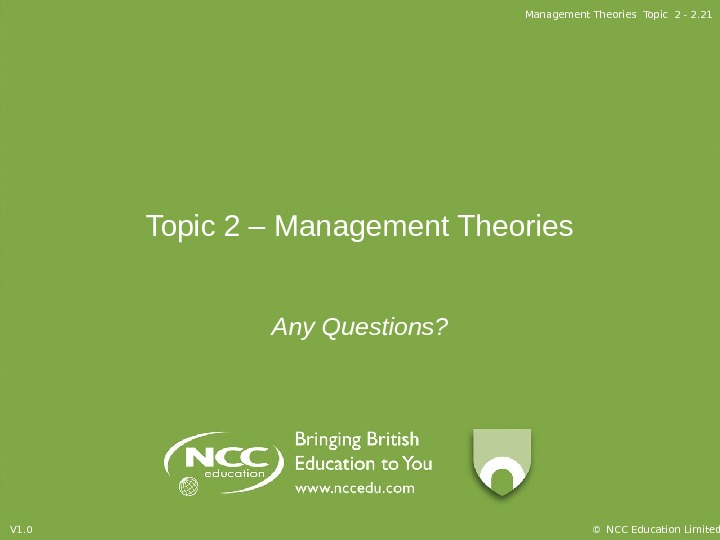
eom_-_lecture_02_-_management_theories.ppt
- Размер: 684.5 Кб
- Количество слайдов: 21
Описание презентации © NCC Education Limited. V 1. 0 Essentials по слайдам
 © NCC Education Limited. V 1. 0 Essentials of Management Topic 2: Management Theories
© NCC Education Limited. V 1. 0 Essentials of Management Topic 2: Management Theories
 Management Theories Topic 2 – 2. 2 © NCC Education Limited. V 1. 0 Scope and Coverage This topic will cover: • The various management theories that have been developed throughout history • The key contributors to these theories • How these theories impact upon today’s management practices
Management Theories Topic 2 – 2. 2 © NCC Education Limited. V 1. 0 Scope and Coverage This topic will cover: • The various management theories that have been developed throughout history • The key contributors to these theories • How these theories impact upon today’s management practices
 Management Theories Topic 2 – 2. 3 © NCC Education Limited. V 1. 0 Learning Outcomes By the end of this topic students will be able to: • Explain the basic principles of the management theories that have been developed over time • Discuss the main concepts upon which theories were developed • Evaluate the ways in which the individual theories are impacting upon the management of businesses today
Management Theories Topic 2 – 2. 3 © NCC Education Limited. V 1. 0 Learning Outcomes By the end of this topic students will be able to: • Explain the basic principles of the management theories that have been developed over time • Discuss the main concepts upon which theories were developed • Evaluate the ways in which the individual theories are impacting upon the management of businesses today
 Management Theories Topic 2 – 2. 4 © NCC Education Limited. V 1. 0 Development of Management Theories • Scientific Management • General Administrative Theorists • Quantitative Approach • Organisational Behaviour • Systems Approach • Contingency Approach
Management Theories Topic 2 – 2. 4 © NCC Education Limited. V 1. 0 Development of Management Theories • Scientific Management • General Administrative Theorists • Quantitative Approach • Organisational Behaviour • Systems Approach • Contingency Approach
 Management Theories Topic 2 – 2. 5 © NCC Education Limited. V 1. 0 Scientific Management Frederick W. Taylor’s Principles of Management: • Develop a science for each element of an individual’s work • Select, train, teach and develop the worker • Ensure that work is done in accordance with the principles of the science that has been developed • Divide work and responsibility almost equally between management and workers
Management Theories Topic 2 – 2. 5 © NCC Education Limited. V 1. 0 Scientific Management Frederick W. Taylor’s Principles of Management: • Develop a science for each element of an individual’s work • Select, train, teach and develop the worker • Ensure that work is done in accordance with the principles of the science that has been developed • Divide work and responsibility almost equally between management and workers
 Management Theories Topic 2 – 2. 6 © NCC Education Limited. V 1. 0 Applying Scientific Management Today • Analysing basic work tasks to be undertaken • Using time and motion studies to eliminate wasted motions • Designing basic incentive schemes based on output
Management Theories Topic 2 – 2. 6 © NCC Education Limited. V 1. 0 Applying Scientific Management Today • Analysing basic work tasks to be undertaken • Using time and motion studies to eliminate wasted motions • Designing basic incentive schemes based on output
 Management Theories Topic 2 – 2. 7 © NCC Education Limited. V 1. 0 General Administrative Theorists Two most prominent theorists: • Henri Fayol – 14 principles of management • Max Weber — bureaucracy
Management Theories Topic 2 – 2. 7 © NCC Education Limited. V 1. 0 General Administrative Theorists Two most prominent theorists: • Henri Fayol – 14 principles of management • Max Weber — bureaucracy
 Management Theories Topic 2 – 2. 8 © NCC Education Limited. V 1. 0 Fayol’s 14 Principles of Management • Division of work • Authority • Discipline • Unity of command • Unity of direction • Subordination of individual interests to the general interest • Remuneration • Centralisation • Scalar chain • Order • Equity • Stability of tenure of personnel • Initiative • Esprit de corps (promoting team spirit)
Management Theories Topic 2 – 2. 8 © NCC Education Limited. V 1. 0 Fayol’s 14 Principles of Management • Division of work • Authority • Discipline • Unity of command • Unity of direction • Subordination of individual interests to the general interest • Remuneration • Centralisation • Scalar chain • Order • Equity • Stability of tenure of personnel • Initiative • Esprit de corps (promoting team spirit)
 Management Theories Topic 2 – 2. 9 © NCC Education Limited. V 1. 0 Weber’s Bureaucracy
Management Theories Topic 2 – 2. 9 © NCC Education Limited. V 1. 0 Weber’s Bureaucracy
 Management Theories Topic 2 – 2. 10 © NCC Education Limited. V 1. 0 Quantitative Approach Application of quantitative techniques: • Statistics • Optimisation models • Information models • Computer simulations …. . to improve decision making
Management Theories Topic 2 – 2. 10 © NCC Education Limited. V 1. 0 Quantitative Approach Application of quantitative techniques: • Statistics • Optimisation models • Information models • Computer simulations …. . to improve decision making
 Management Theories Topic 2 – 2. 11 © NCC Education Limited. V 1. 0 Applying the Quantitative Approach Today • More recently called ‘Operations Research’ or ‘Management Science’ • Contributes to management decision making in planning and control • Helps to interpret the results of software programs in the areas of budgeting, scheduling and quality control
Management Theories Topic 2 – 2. 11 © NCC Education Limited. V 1. 0 Applying the Quantitative Approach Today • More recently called ‘Operations Research’ or ‘Management Science’ • Contributes to management decision making in planning and control • Helps to interpret the results of software programs in the areas of budgeting, scheduling and quality control
 Management Theories Topic 2 – 2. 12 © NCC Education Limited. V 1. 0 Organisational Behaviour Concerned with the actions of people at work • Robert Owen • Hugo Munsterberg • Mary Parker Follett • Chester Barnard The Hawthorne Studies – provided new insights into individual and group behaviour
Management Theories Topic 2 – 2. 12 © NCC Education Limited. V 1. 0 Organisational Behaviour Concerned with the actions of people at work • Robert Owen • Hugo Munsterberg • Mary Parker Follett • Chester Barnard The Hawthorne Studies – provided new insights into individual and group behaviour
 Management Theories Topic 2 – 2. 13 © NCC Education Limited. V 1. 0 Applying the Behavioural Approach Today • Helps to design motivating jobs • Used by managers to assist in working with groups and teams • Used to encourage open communication • Provides the foundation for current thinking on motivation, leadership, group behaviour and development
Management Theories Topic 2 – 2. 13 © NCC Education Limited. V 1. 0 Applying the Behavioural Approach Today • Helps to design motivating jobs • Used by managers to assist in working with groups and teams • Used to encourage open communication • Provides the foundation for current thinking on motivation, leadership, group behaviour and development
 Management Theories Topic 2 – 2. 14 © NCC Education Limited. V 1. 0 The Systems Approach “ A system is a set of interrelated and independent parts arranged in a manner that produces a unified whole” • Closed system – systems that are not influenced by their environment • Open system – systems that dynamically interact with their environment
Management Theories Topic 2 – 2. 14 © NCC Education Limited. V 1. 0 The Systems Approach “ A system is a set of interrelated and independent parts arranged in a manner that produces a unified whole” • Closed system – systems that are not influenced by their environment • Open system – systems that dynamically interact with their environment
 Management Theories Topic 2 – 2. 15 © NCC Education Limited. V 1. 0 The Organisation as an Open System
Management Theories Topic 2 – 2. 15 © NCC Education Limited. V 1. 0 The Organisation as an Open System
 Management Theories Topic 2 – 2. 16 © NCC Education Limited. V 1. 0 Using the Systems Approach Today • Assists management in ensuring that independent parts of an organisation work together • Helps to recognise that decisions taken in one department will impact others • Emphasises the fact that organisations are not self-contained
Management Theories Topic 2 – 2. 16 © NCC Education Limited. V 1. 0 Using the Systems Approach Today • Assists management in ensuring that independent parts of an organisation work together • Helps to recognise that decisions taken in one department will impact others • Emphasises the fact that organisations are not self-contained
 Management Theories Topic 2 – 2. 17 © NCC Education Limited. V 1. 0 The Contingency Approach Key principles: • Organisations are different – size, goals, work etc • They face different situations • Therefore require different approaches to management • No universally applicable management rules that work in all situations
Management Theories Topic 2 – 2. 17 © NCC Education Limited. V 1. 0 The Contingency Approach Key principles: • Organisations are different – size, goals, work etc • They face different situations • Therefore require different approaches to management • No universally applicable management rules that work in all situations
 Management Theories Topic 2 – 2. 18 © NCC Education Limited. V 1. 0 Contingency Variables • Organisation size – as size increases so do problems of coordination • Use of technology – different technologies require different structures and control systems • Environmental uncertainty – degree of uncertainty will influence the management process • Individual differences – employees will have different hopes and expectations of their job
Management Theories Topic 2 – 2. 18 © NCC Education Limited. V 1. 0 Contingency Variables • Organisation size – as size increases so do problems of coordination • Use of technology – different technologies require different structures and control systems • Environmental uncertainty – degree of uncertainty will influence the management process • Individual differences – employees will have different hopes and expectations of their job
 Management Theories Topic 2 – 2. 19 © NCC Education Limited. V 1. 0 Summary • A number of management theories have been developed over time • Each theory has its own particular strengths • The focus of theories is primarily upon working with and motivating people • Many of these theories still have a significant impact upon today’s management practices
Management Theories Topic 2 – 2. 19 © NCC Education Limited. V 1. 0 Summary • A number of management theories have been developed over time • Each theory has its own particular strengths • The focus of theories is primarily upon working with and motivating people • Many of these theories still have a significant impact upon today’s management practices
 Management Theories Topic 2 – 2. 20 © NCC Education Limited. V 1. 0 References Slide 2. 9: Management eighth edition by Robbins, S. P. and Coulter, M. (Pearson/Prentice-Hall) IBN: 978 -0131439948 pp 31 Slide 2. 15: Management eighth edition by Robbins, S. P. and Coulter, M. (Pearson/Prentice-Hall) IBN: 978 -0131439948 pp
Management Theories Topic 2 – 2. 20 © NCC Education Limited. V 1. 0 References Slide 2. 9: Management eighth edition by Robbins, S. P. and Coulter, M. (Pearson/Prentice-Hall) IBN: 978 -0131439948 pp 31 Slide 2. 15: Management eighth edition by Robbins, S. P. and Coulter, M. (Pearson/Prentice-Hall) IBN: 978 -0131439948 pp
 Management Theories Topic 2 — 2. 21 © NCC Education Limited. V 1. 0 Topic 2 – Management Theories Any Questions?
Management Theories Topic 2 — 2. 21 © NCC Education Limited. V 1. 0 Topic 2 – Management Theories Any Questions?

